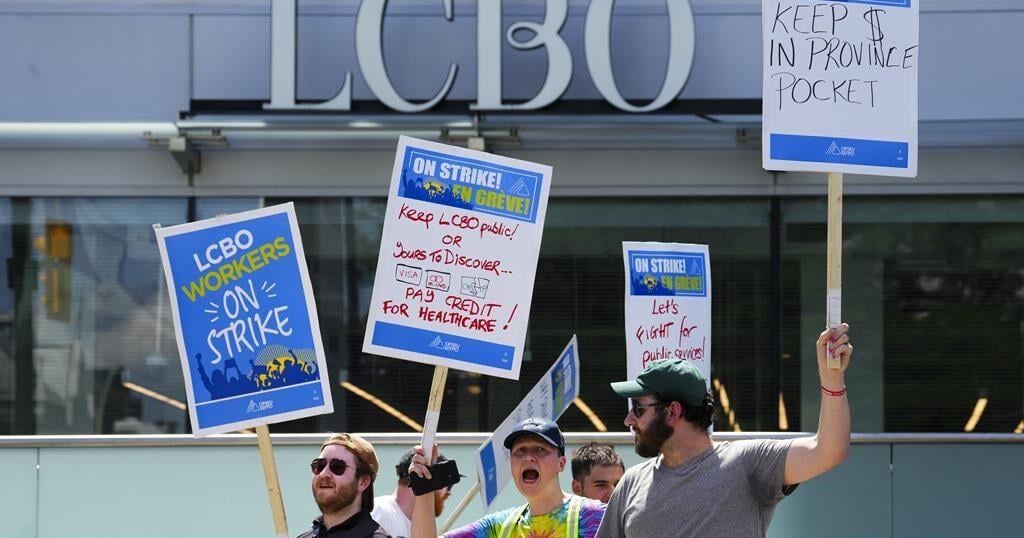Ontario’s main liquor retailer said Sunday it has abandoned plans to open a handful of locations for in-store shopping amid the ongoing strike by thousands of its employees.
The Liquor Control Board of Ontario previously said it planned to open 32 stores three days a week with limited hours if the strike by members of the Ontario Public Service Employees Union went on for longer than two weeks.
LCBO workers represented by OPSEU walked off the job on July 5 after negotiations broke down.
The LCBO says it has been able to serve retail customers since the strike began through online shopping, fulfilling orders within a week.
“Because of this success and because of our confidence in our ability to continue serving retail customers online, we will be re-allocating the personnel that was planned to open LCBO retail stores for in-store shopping to other parts of the operations to further enhance support for bars, restaurants and other businesses,” the organization said in a press release Sunday.
Within hours of the announcement, Restaurants Canada issued a statement saying its members are reassured by word that “limited resources will now be directed towards safeguarding vulnerable businesses.”
The association said restaurants and bars have been finding the items they need either out of stock or limited in availability. It says the industry is approaching a “critical phase” of increasing demand from businesses, and is calling on the government and the LCBO to prioritize resources toward restaurants and bars.
OPSEU, which represents about 10,000 LCBO workers, said Friday that it’s fighting for the future of the LCBO and Ontario and repeated criticisms of Premier Doug Ford’s plans to open up the province’s alcohol market by allowing ready-to-drink cocktails to be sold outside LCBO stores.
The Alcohol and Gaming Commission of Ontario said that under the government’s alcohol expansion plans, it has issued licences for alcohol sales to 3,105 convenience stores and 37 new grocery stores. Newly licensed convenience stores can start selling alcohol in early September, while newly licensed grocery stores can do so from Oct. 31 onward.
The union has said this plan poses an existential threat to the LCBO and could lead to major job losses.
“To us, seeing those products go into … new private retail locations (like gas stations and convenience chains) means less hours of work, fewer jobs, and lower public revenues,” the union said in the July 11 release.
The union said Friday that the employer has refused to bargain, accusing Ford of forcing the strike to further an agenda that involves further opening up the alcohol marketplace and dismantling the LCBO in favour of corporate profits.
Ford has said the issue is a non-starter for negotiations, while the LCBO has said it’s a matter of public policy and should not be discussed as part of bargaining.
In its statement Sunday, the LCBO said it wants the strike to end and is committed to reaching an agreement.
Some groups have expressed support for Ford’s plan, including an association that represents 12 local producers in Ontario.
Natasha Fritzley, chair of the Ontario Craft RTD Coalition, said in a statement Sunday that the ready-to-drink industry is growing in the province. However, she said that since these drinks can only be sold at the LCBO, unlike beer and wine, it’s difficult to “get their products into the hands of consumers.”
“Allowing RTDs to be sold at grocery and convenience stores will provide small Ontario businesses like ours with the chance to reach our consumers, grow our businesses, and create more local jobs in communities across the province,” said Fritzley.
This report by The Canadian Press was first published July 14, 2024.
